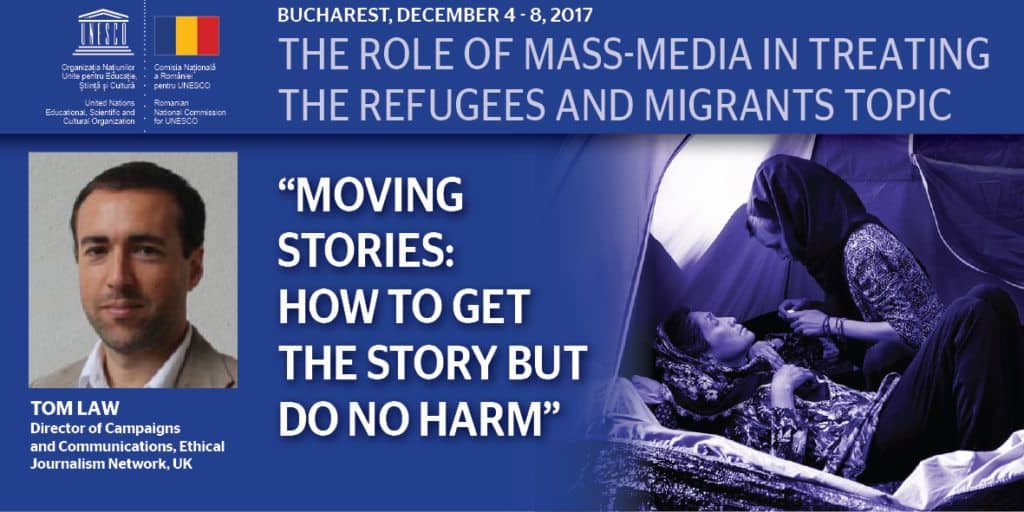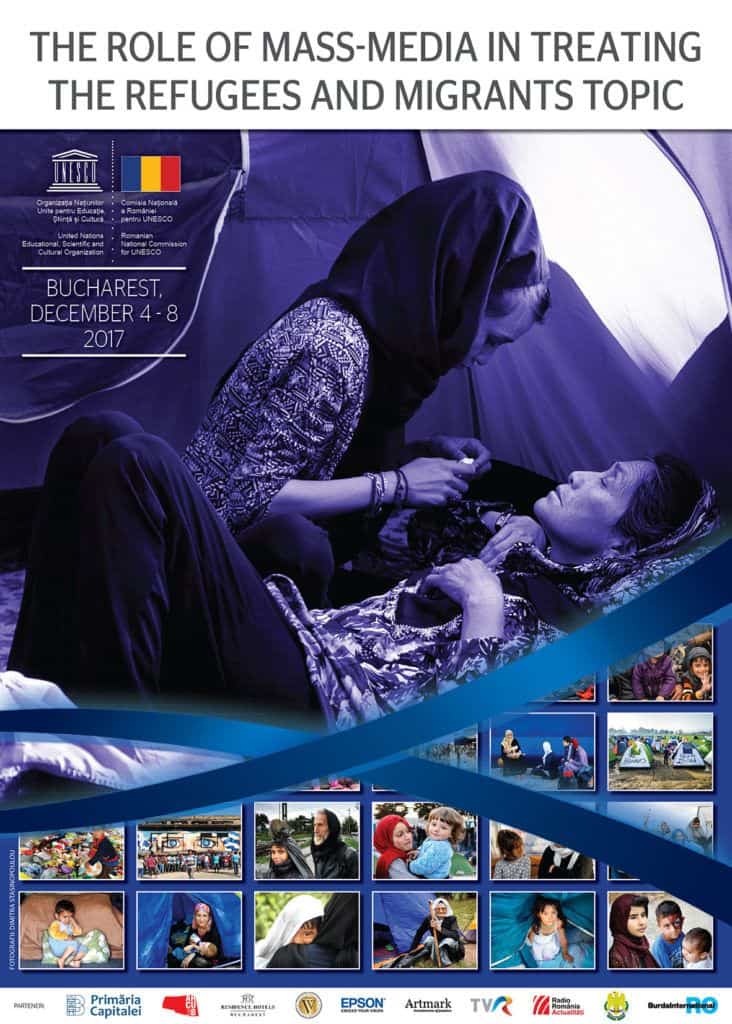The role of mass-media in treating the refugees & migrants
Between December 4 – 8, 2017, the National Commission of Romania for UNESCO hosted a week on training for journalists from 16 European countries on the reporting on refugees and migrants. Journalists from and media representatives from 16 countries took part in the training: Austria, Belgium, France, Germany, Greece, Hungary, Italy, Latvia, Poland, Romania, Slovenia, Spain, Sweden, Switzerland, Turkey and UK.

The Ethical Journalism Network’s, Tom Law delivered a training session on Day 5 entitled, “Moving Stories: How to get the story but do no harm”. The training drew on the findings of the EJN’s three recent studies on migration reporting, as well as the EJN test for hate speech.
Over the 5 days, there were 5 training courses, offered by specialists from Germany, Hungary, the United Kingdom and Romania, as well as complementary presentations on topics related to the project theme. Among the institutions and organizations whose representatives are involved in the project activities are the German Marshall Fund of the United States, the Center for Media, Data and Society at the School of Public Policy of the Central European University, the Ethical Journalism Network, UNHCR Romania, the International Organization for Migration – Romania office, the Directorate – General for International Cooperation and Development (DEVCO) of the European Commission, TVR, the Ministry of National Defense, the Ministry of Foreign Affairs, the General Inspectorate for Immigration, the Romanian Border Police.
The role of mass media in treating the refugees & migrants topic
Programme

Day 1, December 4
Training: “Moral act or legal duty? How to avoid myth-building in refugee reporting” part 1 – Petra Sorge, Journalist and Media Analyst
Presentation: “The media coverage of the actions undertaken by the Romanian Armed Forces during international missions in support of refugee and migrant groups” – Valentin Vasile, Deputy Director, Information and Public Relations Directorate, Ministry of National Defense
Presentation: ”Shifting migration routes and the curse of poverty” – Nicolae Melinescu, journalist, PhD in International Relations
Day 2, December 5
Training: “Global Displacement and UNHCR. Refugees: Journey from Challenges to Opportunities” – Gabriela Leu, Public Information/ Communications Associate, UNHCR Romania
Visit to the International Organization for Migration, Romania office, and the Migrant’s Assistance and Counseling Center
Day 3, December 6
Training: “Media effects and migration – a backgrounder on an evolving field of research” – Timo Tonassi, Migration Research Fellow at the German Marshall Fund of the United States
Presentation: “Migration and Forced Displacement in EU Development Policy” – Dr. Anna Schmidt, Policy Officer Migration & Forced Displacement, Directorate-General Development and International Cooperation, European Commission
Presentation: “Legal, policy and operation framework in Romania. Facts and figures” – Police Chief Commissioner Emil Niculescu, Director, Strategic Management Directorate, General Inspectorate for Immigration
Presentation: “The war correspondent and the refugees” – Adelin Petrișor, Chief International Correspondent, TVR (Romanian Television)
Day 4, December 7
Training: “The politics of media coverage: the framing of the “refugee crisis”” – Eva Bognar, Senior Program Officer, Center for Media, Data and Society at the School of Public Policy of Central European University in Budapest
Presentation: “Measures adopted by the Romanian Border Police for securing the state border” – Police Chief Commissioner Adrian Popescu, Assignee Deputy Inspector General, Romanian Border Police
Presentation: “Migrants and Political Correctness” – Mircea Naidin, Diplomatic Counsellor, Globalisation General Directorate, Ministry of Foreign Affairs
Day 5, December 8
Training: “Moving Stories: How to get the story but do no harm” – Tom Law, Director of Campaigns and Communications, Ethical Journalism Network